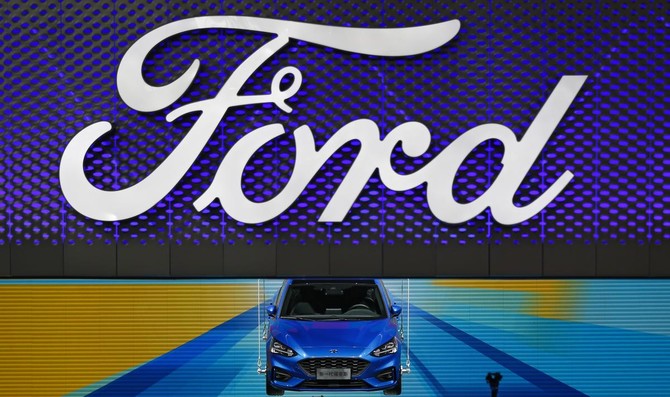WASHINGTON: Ford won’t be moving production of a hatchback wagon to the United States from China — despite President Donald Trump’s claim Sunday that his taxes on Chinese imports mean the Focus Active can be built in America.
Citing Trump’s new tariffs, Ford on Aug. 31 said it was dropping plans to ship the Focus Active from China to America.
Trump took to Twitter Sunday to declare victory and write: “This is just the beginning. This car can now be BUILT IN THE USA. and Ford will pay no tariffs!”
But in a statement Sunday, Ford said “it would not be profitable to build the Focus Active in the US” given forecast yearly sales below 50,000.
For now, that means Ford simply won’t sell the vehicle in the United States. Kristin Dziczek of the Center for Automotive Research said that Ford can make Focuses “in many other plants around the world, so if they decided to continue to sell a Focus variant in the US market, there are several options other than building it in the United States.”
In April, Ford announced plans to stop making cars in the United States — except for the iconic Mustang — and to focus on more profitable SUVs. It stopped making Focus sedans at a Wayne, Michigan, plant in May. The plan, said industry analyst Ed Kim of AutoPacific, was to pare down the Focus lineup to Active wagons and import them from China.
“Without the tariffs, the business case was pretty solid for that model in the US market,” Kim said.
Demand for small cars in the US has been waning for years with relatively low gasoline prices and a shift from cars to SUVs and trucks.
If Ford sold fewer than 50,000 Focus Active wagons per year, it would run a US factory on only one shift per day, which isn’t cost-effective, Dziczek said. Automakers like to run plants on at least two shifts, and preferably three per day to cover the cost of building and equipping the factory, and to turn a profit.
Ford also wouldn’t want to spend millions on equipment to build the Focus Active here because at low sales volumes it wouldn’t get a good return on its investment, Dziczek said.
If sales were high enough to justify production at a US plant, the price of a compact vehicle isn’t high enough to cover the difference in wages here, she said.
“The margins are very slim,” Dziczek said. “Even if you had demand and volume, it’s still very difficult to build a small car in the US profitably, which is why you find very few of them here.”
In China, labor costs are about $8 per hour including benefits, but it’s more than $52 per hour in the US, according to Dziczek.
Ford, BMW, Mercedes and others export about 250,000 vehicles to China from the US each year, Dziczek said. Most of them are luxury cars and SUVs with higher profit margins that can cover higher US wages, she said.
For the Focus Active, the tariffs on Chinese vehicles changed everything. The United States on July 6 began imposing a 25 percent tax on $34 billion in Chinese imports, including motor vehicles. Last month, it added tariffs to another $16 billion in Chinese goods and is readying taxes on another $200 billion worth. China is retaliating with its own tariffs on US products.
The world’s two biggest economies are clashing over US allegations that China deploys predatory tactics — including outright cybertheft — to acquire technology from US companies and challenge American technological dominance.
Despite Trump tweet, Ford says it won’t make hatchback in US
Despite Trump tweet, Ford says it won’t make hatchback in US

- Citing Trump’s new tariffs, Ford on Aug. 31 said it was dropping plans to ship the Focus Active from China to America
- Trump took to Twitter Sunday to declare victory and write: “This is just the beginning. This car can now be BUILT IN THE USA. and Ford will pay no tariffs!”
Saudi healthcare to advance with major digital tech partnership

RIYADH: The Saudi healthcare system is set to advance as two of the country’s major companies partner to leverage digital technologies to enhance the Kingdom’s capabilities.
SAMI Advanced Electronics Co., a wholly owned subsidiary of SAMI, the nation’s defense and digital solutions provider, has signed a cooperation agreement with the National Unified Procurement Co., a Public Investment Fund company.
The agreement, signed on May 27, will provide solutions for medication tracking and IT infrastructure and increase local content through medical devices manufacturing and maintenance.
This partnership demonstrates SAMI-AEC’s unremitting efforts to build a harmonious and applicable healthcare system in Saudi Arabia based on digital technologies.
Ziad Al-Musallam, CEO of SAMI-AEC, commented on the agreement, saying that they are honored to collaborate with NUPCO, as this deal underscores the unwavering commitment of both entities to bolstering efforts aimed at enhancing the healthcare ecosystem in Saudi Arabia.
“At SAMI-AEC, we firmly believe in the significance of augmenting public health services through digital solutions and delivering e-health services. This involves integrating effective, fast technologies to empower the healthcare sector, aligning with the objectives of Saudi Vision 2030,” he said.
Fahad Al-Shebel, CEO of NUPCO, highlighted the agreement’s importance and its role in fortifying the healthcare infrastructure and facilitating access to the integrated technology offered by SAMI-Advanced Electronics Co.
Aiming to upgrade the healthcare sector by improving its facilities in all public hospitals and medical centers in the Kingdom, NUPCO is the country’s largest central company providing medical purchasing, storage, and distribution services for medicines, devices, and supplies.
With a workforce of over 3,320 individuals, 85 percent of whom are Saudi nationals, SAMI-AEC has positioned itself as a leader in electronics, technology, engineering, and manufacturing. Its services span sectors such as defense and aerospace, digital, energy, and security.
Over 800 of the company’s employees are engineers and certified experts, reaffirming the dedication of SAMI-AEC, which was established in 1988, to excellence and innovation.
On the other hand, NUPCO was established in 2009 with SR1.5 billion in capital. It is the leading company in Saudi Arabia in procurement, logistics, and supply chain management for pharmaceuticals, medical devices, and supplies for governmental hospitals.
Closing Bell: Saudi main index continues downward trend to close at 11,660

RIYADH: Saudi Arabia’s Tadawul All Share Index continued its downward movement for the third consecutive session this week, as it shed 171.28 points to close at 11,659.94 on Tuesday.
The total trading turnover of the benchmark index was SR5.34 billion ($1.42 billion), with 23 stocks advancing and 202 declining.
The Kingdom’s parallel market, Nomu, also slipped by 0.81 percent to 26,234.79, while the MSCI Tadawul Index shed 20.97 points to close at 1,449.44.
The best-performing stock on the main index was Sustained Infrastructure Holding Co. The firm’s share price soared by 6.2 percent to SR34.25.
Other top performers were the Mediterranean and Gulf Insurance and Reinsurance Co. and AYYAN Investment Co., whose share prices edged up by 3.98 percent and 3.63 percent respectively.
The worst-performing stock on the benchmark index was Saudi utility giant ACWA Power, as its share price slid by 4.68 percent to SR456.60.
On the announcements front, Etihad Atheeb Telecommunication Co. said that it was awarded two projects worth SR45.51 million by Technical and Vocational Training Corp. to provide dedicated Internet services in 77 locations.
In a Tadawul statement, the telecommunication provider said that the first project has a value of SR23.64 million, while the second one amounts to SR21.87 million.
Meanwhile, Mouwasat Medical Services Co. announced that its shareholders have approved the board’s recommendation to distribute a 17.5 percent cash dividend, or SR 1.75 per share for 2023.
In March, Mouwasat Medical Services Co. had revealed that its net profit witnessed a growth of 10 percent in 2023 to SR657.7 million, compared to the previous year.
Al Moammar Information Systems Co., on Tuesday, revealed that it received new orders to increase the capacity of data centers at a total value of SR 75.2 million.
In a statement to Tadawul, the company added that further developments of the order will be unveiled in due course.
PIF’s Halal Products Development Co. invests in Singapore-based cosmetics firm

RIYADH: In a bid to localize the Kingdom’s cosmetics and personal care industry, the Halal Products Development Co. announced an investment in a Singapore-based fast-moving consumer goods conglomerate.
The Public Investment Fund-owned company signed a binding agreement with Believe — a company specializing in the halal cosmetics and personal care field.
As per the agreement, the company will relocate its headquarters from Singapore to Saudi Arabia and establish a factory to manufacture its products, the Saudi Press Agency reported.
The new headquarters will also serve as a major center for exporting the company’s products to various countries of the world.
This move is in line with the PIF-owned firm’s goal to strengthen the halal industries in Saudi Arabia and provide high-quality products compatible with Islamic standards.
Halal Products Development Co. CEO Fahad Al-Nuhait said that investing in this sector is a very important first step that serves as a major catalyst for developing and localizing the manufacturing of halal cosmetics and personal care.
In return, this is expected to raise the efficiency of the sector and support research as well as development efforts to improve the services provided locally and globally, Al-Nuhait added.
The CEO said it will also facilitate the transfer of the expertise and resources to the Kingdom.
Moreover, it will also contribute to achieving the goals of the Kingdom’s Vision 2030 by creating direct and indirect job opportunities.
Believe CEO Ankit Mahajan said this partnership represents a strategic opportunity to expand the scope of investment and boost manufacturing capabilities.
The agreement will also provide contract manufacturing services for local brands in the initial stage and will expand to international brands in the future.
In August, Halal Products Development Co. signed a strategic cooperation agreement with the Saudi Exports Development Authority to launch the Halal Products Manufacturing Accelerator Program.
According to a statement, the new program came amid the Kingdom’s efforts to become a global hub for halal food products and accelerate the growth of the sector.
TVM Capital Healthcare launches $250m fund for Saudi medical firms

RIYADH: Saudi medical companies stand to benefit as private equity firm TVM Capital Healthcare unveils its second pool of funding valued at $250 million for the Middle East.
Since 2009, the international growth capital investment fund has operated in the Middle East, expanding to Southeast Asia in 2021.
The launch of the new fund builds on the firm’s past successes in the region, delivering compelling returns and showcasing its expertise in sourcing deals and nurturing the growth of sustainable enterprises, according to a press release.
Bandr Al-Homaly, managing director and CEO of Jada Fund of Funds, said that the closing of the deal marks an important milestone in mobilizing private capital into Saudi Arabia’s healthcare sector.
“We are pleased to lead the investment, providing capital to support the development of the sector in line with Vision 2030,” he said.
TVM Capital focuses on addressing medical needs through strategic investments in entrepreneurial ventures.
These efforts bring about lasting positive impacts in local communities and offer significant returns for investors, it said.
The firm said it has built a reputation as an international fund manager involved in financing and overseeing major medical companies within the Kingdom.
The company also invests in healthcare growth deals in Europe and the US to support these firms’ expansion plans for Saudi Arabia and the wider Gulf Cooperation Council.
With this two-pronged strategy, TVM Capital aims to bolster the Saudi economy and enhance the region’s access to cutting-edge products, technologies, and services.
Chairman and CEO Helmut M. Schuehsler expressed pride in attracting a notable consortium of institutional and family investment groups from Saudi Arabia, other GCC countries, and Europe. They are investing in a specialized capital pool dedicated to domestic companies in the Kingdom and international firms entering the market.
“We are uniquely positioned for success because our leadership team comprises executives with long-standing expertise in Europe and the US, who have built excellent international networks throughout their careers, alongside local Saudi healthcare experts,” he said.
The chairman noted that their investment journey in the GCC and Egypt spans over 13 years, with a specific focus on Saudi Arabia since 2015 through their previous portfolio companies, ProVita International Medical Center and Cambridge International Medical Center.
“Today, we are truly excited about our ability to enhance the local and regional healthcare ecosystem at a much larger scale, helping to improve access to high-quality patient care, medical products, and treatment regimens across the Kingdom,” Schuehsler said.
Among the initial investments of the fund are Baraya Extended Care, a chain of long-term, post-acute care and rehabilitation clinics based in Riyadh; and DEBx Medical, a developer and manufacturer of innovative products for chronic wound treatment based in Amsterdam, which is set to enter the Saudi market. Additionally, neurocare group, a provider of personalized mental health services and products headquartered in Munich, with clinics in the US, the Netherlands, and Australia, is gearing up to enter Saudi Arabia and the GCC.
According to the statement, additional deals encompass longevity and genomics, oncology and pharmaceuticals, as well as manufacturing and diagnostics.
TVM Capital operates offices in Riyadh, Dubai, Singapore, and Ho Chi Minh City, with supporting offices in Munich and Boston.
The multinational law firm Morgan Lewis represented the firm in the fundraiser.
Egypt sees 30.2% surge in foreigners acquiring work licenses in 2023

RIYADH: Egypt’s private and investment sector experienced an annual increase of 30.2 percent in the number of foreigners acquiring work licenses in 2023.
Data from the Central Agency for Public Mobilization and Statistics revealed a significant surge in the total count of foreign nationals granted licenses, reaching 17,357 individuals, a leap from the previous year’s 13,331.
Of these permits, 7,973 were issued for the first time in 2023, constituting a significant portion of the total influx at 45.9 percent.
The largest representation came from expatriates from non-Arab Asian countries, comprising 36.2 percent or 6,275 individuals, followed closely by expats from European countries at 34.4 percent or 5,975 individuals.
Arab countries accounted for 20.1 percent, with 3,487 foreigners, while the Americas made up 4.5 percent, with 779 foreigners.
The Ministry of Manpower issued 46.8 percent of the licenses for work in the private sector and investment, making it the leading issuer in Egypt in 2023, with a total of 8,122 work permits released.
Investment offices followed at 35.9 percent, with corporate businesses at 12.9 percent, and petroleum firms at 4.4 percent of the total licenses granted to foreigners for work in these industries in 2023.
Egypt’s new economic path, centered on structural reforms to empower the private sector for growth and investment attraction, has begun yielding positive results, as stated by the country’s finance minister last month.
Mohamed Maait highlighted that despite the harsh impacts of global and regional economic crises, Egypt has seen financial indicators surpass budget estimates and targets over the past nine months of the fiscal year 2023-2024, Egyptian daily Al-Ahram reported.
The minister noted that this success reflects the international recognition of the North African country’s economy for achieving better-than-expected performance metrics.













